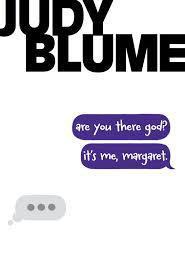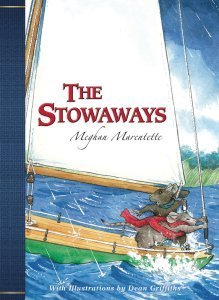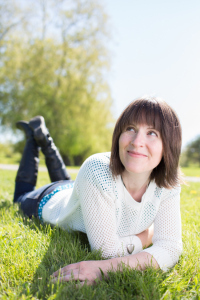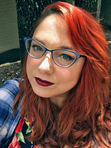Banned Books Month: Guest Post from Meghan Marentette: Go Ahead, Ban That DEPLORABLE Book!
You could say I have an outsider’s point of view. When I was in school in the 80s, I don’t remember a single teacher or parent who challenged the existence of a book in a curriculum. Books were easily accessible, and in those days, school libraries were full of books! (Now many seem so sadly underfunded). My parents were liberal thinkers, my teachers on their way to it, and my city of Halifax had a burgeoning arts community, to which I was destined to belong. Life was on track to become well-rounded, and fulfilling.

Atheneum Books for Young Readers, Reprint Edition, April 2014.
So at age 12, rather innocently, I borrowed Judy Blume’s ARE YOU THERE GOD? IT’S ME, MARGARET, endorsed by my junior high librarian, without any clue that in places southwest of here, it was considered a misguided piece of trash. To me, it was a fun read that confirmed my pubescent thoughts were common and normal. I was unaware there was any conflict about its publication, or the fact that I had access to it. No one said anything about that.
Meanwhile, in other towns, girls were having their purity unpeeled just by reading Judy Blume. By the steady gavel of judgment, they learned what shame was, before I knew it existed.
In high school, I read THE CATCHER IN THE RYE as part of the curriculum without the slightest notion that its contents were offensive. Would Holden Caulfield muster up the energy to murder the next “phony” he met? Well, that didn’t really occur to me; my reading skills weren’t the best in comprehension at age fifteen. And I certainly don’t remember my teacher drawing attention to a dark side of his character, as if he was out of line with normal teenage thought. But if Holden did gun down the “phonies”, would I have been influenced to do the same, feeling similarly that there were people in my realm I didn’t trust? Um, no. It was a book. Of fiction. That I had to read. For school.

Little, Brown and Company, Mass Market Edition, May 1991.
But meanwhile, there were teenagers in other towns who, under iron fist, learned such literature could turn them into killers if they let Salinger warp their malleable, baby brains. Ah, the irony. (Maybe it did provide a bizarre rationale for a few demented adult minds to kill, but we can’t judge that a book has that much power when the other 65 million people who read it didn’t pick up a gun.)
But I can’t say I feel like I had a better education than these other girls and boys, despite my schools being open to all literature, and their schools frantically screening all written word. Maybe school was calmer for me, but then maybe those kids learned more about human nature by living under the thumb of it, than I did by reading about it. Sometimes a little clashing of the minds is necessary to get the brain bubbling and the feet in motion.
Contrast is a necessary part of education. How do we know one point of view suits society beneficially, if we aren’t aware of another point of view, to which we have unfettered access? How can we imagine that if we discourage critical discussion among young minds, we can expect them to make informed decisions as adults? If we don’t discuss unhappy thoughts, or ‘negative’ ideas, how can we really understand what a positive thought or action is?
This is the belief of liberal schools who don’t ban books. They let it all hang out there, and teach tolerance to the nth degree. And it works, sure. My classmates and I are all ‘big picture’ thinkers now. Adults who respect our neighbours and spay our kittens. We pay our taxes and watch The Daily Show. We welcome immigrants and we learn their recipes. We sign a lot of petitions from our computer chairs, in concern for the oceans and slave labour. You’re gay? That’s nice.
But when I think about an effective education, one that challenges people to get up out of the chair and go to that protest march and demand change, I think it goes well beyond a liberal curriculum supported by contrasting thought. It comes from being faced with actual conflict.
I think about the girl, only three years ago, whose undisclosed school produced a list of 120 books forbidden to its students. So what did she do? She managed a library of 60 of those banned books out of her school locker. When I heard about it, I felt excited for her. She insisted on a complete education, and got one by her own means, without letting her elders define what’s ‘important’. She learned to act.
Because her school brought attention to those books in a negative way, not only she, but many of her school mates, wanted to read them, and pursued reading. After all, what teenager won’t try the exact thing you tell them not to do? Gaggles of students must have texted each other under their desks: “What’s inside those secret pages that could foul us up as human beings? Let’s find out!” And in so doing, they questioned their education and learned to analyze literature, when otherwise they might have been dreaming of Bieber.
I’m not saying we should ban books merely to draw attention to them―that would be more transparent than twenty-year-old underwear! And I’m not even sure it’s relevant to ban a book anymore, what with the internet and all (it’s easy to order a banned book, or study reams of forum chat about its content). Let me be clear, I do not support the banning of books―how could I, when I am one of the students who benefitted by reading them? (Let me also be clear that I am addressing the banning of books to teens in wealthy, democratic societies―lack of access to books and education in general is an entirely different discussion).

Pajama Press, April 2014.
But I do wonder deeply about the efficacy of my own even-keeled education. I wonder if, because I grew up in schools where nothing was challenged, I became a lazy student. I took for granted that my education was complete and I ‘knew it all’, which, of course, I did not. Where were the heated discussions that would lead me to question my world? In another town, I guess. I wonder how much longer it took me to grow up―to realize that my life, and my education, was mine for the making―when whatever I ‘needed to know’ to become a well-rounded person was handed to me. Where was my motivation to search for the truth?
In many ways, I wish I had been more involved in my own education. By grade 12, I was skipping a lot of school and still making As. School was way too easy, at least in the 80s. Maybe it’s crazy to wish for more turmoil in my teen years when there was plenty of self-induced conflict. But maybe, or very likely, clashes of ideology in the classroom would have been better for my personal growth than the conflict I sought out in relationships instead, and would take years to get over.
The act of banning books is appalling at face value. But let’s consider how it brings up a valuable discourse that might not take place otherwise. The more an ideology goes unchallenged, the less it is understood. If I wrote a book that had all nice characters who accepted each other for who they are, and everyone got along famously, would you read it? No. Would your kids learn anything from it? No. They might live in a world where everything is perfect and tolerant and nice, but then what happens one day when someone does something that doesn’t jive with their ideal? They freak out, like I did. And maybe they can’t find a solution without feeling personally rejected. Life might feel harder for them than you wanted.
After decades of growing up, perhaps very late, I finally started to write. And what do I write about? Conflict! I crave it. My favourite characters to write are the messy ones. Gran is moody. She’s rude. She never explains herself. And my readers love her.
So maybe I can’t complain about my ‘sleepy’ education either, if it eventually led me to write with passion. I’m just saying, when a book is banned, it’s not necessarily a bad thing. It could actually provide an opportunity for an otherwise unchallenged child to question her values sooner, and learn that disagreements are a workable situation. And isn’t that the best education a child can get?

Meghan Marentette.
Meghan Marentette is the author of THE STOWAWAYS, a middle-grade novel about a young mouse who finds plenty of conflict when he challenges the narrow horizons of his childhood. Inspired by a job making tiny costumes for stop-motion animation puppets, THE STOWAWAYS has been nominated for the CLA Book of the Year for Children Award, the Monica Hughes Award for Science Fiction and Fantasy, and the Ann Connor Brimer Award. Meghan continues to write and design costumes for film and television in Halifax, Nova Scotia.








